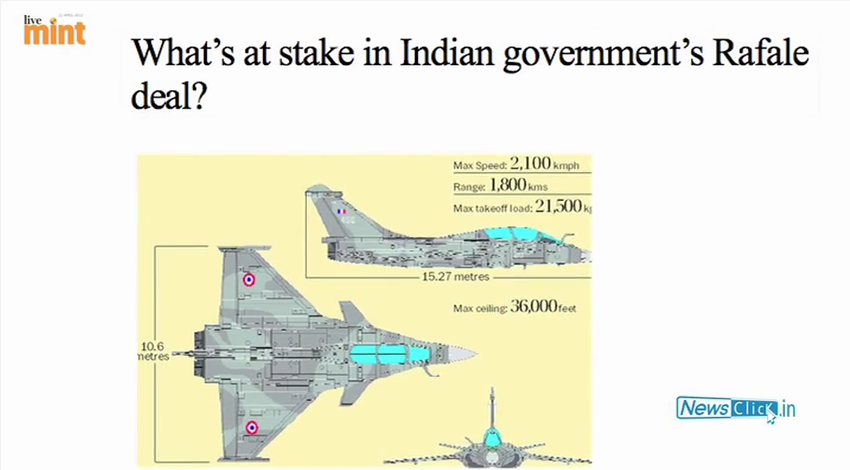Rafale Deal: Meeting Defence Needs or PR for Modi?
The Modi government has recently made a quick Government to Government (G2G) deal with France for acquiring off the shelf 36 Rafale fighter aircrafts. The prices --it appears -- are yet to be negotiated. Newsclick interviewed D. Raghunandan, President, All India People's Science Network and a defence analyst to discuss the deal. According to Raghunandan, the deal being a G2G instead of public bidding as originally envisaged, is back to arbitrary decision making on defence deals. Reverting back to such a policy does not have any transparency and opens up a huge scope for corruption in defence deals.
Specific to the deal, Raghunandan stated that it contradicts Modi’s much hyped policy of “Make in India”. Originally, the deal was to have 126 aircrafts, out of which 108 would have been made in India by HAL. Dassault, the makers of Rafale, did not agree to technology transfer and have now have been rewarded with outright purchase of 36 aircrafts. Instead of the original tender which involved 126 aircrafts, 36 Rafales bought in this way, neither meets the airforce's needs of replacing almost 200 MIGs nor the long-term objective of India developing a self-reliant defence industry. All it has done is help Modi make a big PR splash in Paris, at a great cost to India's defence and procurement policy.

Prabir Purkayastha- Hello and welcome to Newsclick. Toady we have with us D Raghunandan of the All India Peoples Science Network and commentator on defense related issues.
Raghu, we have recent Rafale deal which has been concluded with Modi it appears. We don't know the price and it also seems what was almost 7 or 8 years process of negotiations and the tender has been abandoned. So how do you look at this? Have we gained out of this? Have we got better prices? what really happened?
D Raghunandan - I personally think we have lost in three ways. The first is that I think we have now reopened the entire question of how do we buy equipments from abroad. The BJP govt today virtually saying that this method of going for a global tender is wrong and that all strategic equipment should be bought on a purely govt to govt basis; which to my mind will re-open the old questions of special interests, whether there are corruption involved or not, etc. The idea of an open tender was precisely so that these kinds of questions would be avoided. Thats one loss. The second loss is the original tender was for 126 aircrafts. The idea being that you would have sufficient aircraft to form a muscular component of the Indian Air Force. Today with 36 aircrafts being accord, it is just couple of squadron of aircraft. We are going back to what I have long called the managerial approach of the Indian Services. It is like a Zoo. You have got a few squadron of Jaguars, you have got a few squadron of Mirages, you have got a few squadron of MiG-27; This is posing enormous logistical and maintenance problems to our ground crews. Each of we whom have to be aware of the maintenance procedures, talks-purse for dozen or more aircrafts, this is not a way of a professional Air Force should operate. And the third loss is that the earlier contract being for a larger number of aircrafts also involved sufficient manufactures in India. The 36 aircrafts completely purchased outright where that is going nobody knows it.
Prabir - Three issues you have raised. Let us come to the first one, which is procurement policy. Now the procurement policy was actually set at the Vajpayee govt. So what they are scrapping is their policy set under NDA; where they said what happened before wasn't right, we need an open purchase procurement policy and this is right. So they are really disagreeing with their own policies.
Raghu - Thats right and they are also disagreeing with the general trend today which is what World Bank insists on, all the international agencies insist on, that everything should be done through an open tendering process. Now they are saying all strategic procurement should be done through govt. Who is going to decide what is to be procured, who is going to decide?
Prabir - Raghu, it appears that this is a consequence of Modi visiting France. So it is this govt to govt contract really means what Mr Modi feels when he visits a particular country. That seems to be the defense policy.
Raghu - Also the danger of this is, tomorrow most of the deals that we have defense hardware purchases India has done from US has been govt to govt? this will be govt to govt? tomorrow they will do Israel govt to govt? This is easier politically expedient but we don't know what is going to come out of it. Transparency goes out of the window and nobody is the wiser as to what these contracts are all about.
Prabir - Even today we don't even have the price of the aircrafts what is been decided. And now they are saying actually the price etc would be decided at the negotiations that will take place now. 36 aircrafts you decided to purchase before and then you discuss what the price and terms and condition of it are going to be.
Raghu - Very strange, and one assume that after these long years of setting the terms of the tender, negotiating based on the Air Force requirement of 126 aircrafts. So the Air Force requirement also goes out the window. So whose requirement is this? the defense ministers? the Modi govt?
Prabir - Or Mr Modi's? As a prime minister, he want to shine in service.
Raghu - I think this is a completely non-transparent way of doing things. And once again puts the politics ahead of what this strategic and military's requirements are
Prabir - And in this case the politics is really the Prime Minister's need to negotiate a particular deal. Coming to the second issue that you have raised on the question of what the proposal and problems and so on. This had actually a position that 108 aircrafts to be manufactured in India by HAL that was the part of the condition. So HAL is now being left high and dry. It is also Mr Manohar Parrikar also said that it could run by somebody else as well and it appears that the Reliance, Mr Anil Ambani was in negotiation to Dassault just after this. So does it again seem to be a Pork barrel approach? that you are going to favor some particular private company in all these?
Raghu - 100% agreed and I think the whole idea of having a private sector partner, for the international OEMs(Original Equipment Manufacturers) suits the OEM because they know very well that if they have a state sector partner in India, the bargaining power of the state sector partner will be greater and they will have to deal more in technology transfer. Where as in private sector partner like the Reliance group who have no background in aviation or strategic weapons manufacture of any kind will be totally subcontractors and they will be essentially acting as a outreach subcontracting partner for Dassault; who will subcontract whatever they feel like. So there is no prospect for any genuine technology transfer if there is a private sector technology partner of this kind. The big loss also is apart from the large chunk of domestic manufacture that would have taken place with 128 aircraft is that, the structure of the Air Force, the move to getting up bulk of these from Dassault meant that the Air Force was structured around 3 or 4 aircraft, each of substantial numbers. The Sukhois, the Rafales, the LCAs to come and the standing MiGs which are there soon going to be faced out and then the 5th generation aircraft which we are supposedly co-developing with Russia. That make for a more integrated, thought-through and rationalized Air Force, than I said the zoo approach which we are stuck with today because of these serial small lot procurements that we do.
Prabir - The other part of this, it is the 'Make in India' so called doming that the govt is doing.
Raghu - Yeah it is gone out of the window if you are buying outright.
Prabir - So 50% of set is being thrown out, HAL is being sold out, You have 36 of the shelf items aircraft brought, so there is no really 'Make in India' and yet you talk about 'Make in India' with same breathe. So this is the really some which would under any other circumstance would have called for a lot of investigations. So the 7 year process which you abundant in one day, which has been the Air Force involved in it. You don't give the other competent; in this case the Eurofighter a chance to match the win and it is all done as a part of state visit. This is completely arbitrary.
Raghu - Absolutely. I think it is completely arbitrary, it is completely non-transparent, nobody knows whose needs are being met and if the argument is that, it is a strategic deal and therefore it should be done govt to govt basis, then surely, those protracted negotiations on the Dassault Rafale if it is going on, govt to govt could have contracted the areas of disagreement and the same deal could have gone through.
Prabir - In a Last point that the whole argument that we need urgently aircrafts, well Dassault is not going to be really able to give it before 4 years, that is it's aircraft. The whole I think making one fighter a month at the moment. For them to even gear up, it is going to take them 18 months. So this argument itself also doesn't stand much in ground.
Raghu - Absolutely right and the urgency also was not just for two squadron of aircraft. If there is an urgency, you are replacing something like 200+ MIGs that you are taking of; two squadron of Rafales is not going to solve that problem. So I really don't see what is happening here and where this is going.
Prabir - Thank you very much Raghu. Hope to discuss this with you further when such issues come up again. Thank you very much.
DISCLAIMER: Please note that transcripts for Newsclick are typed from a recording of the program. Newsclick cannot guarantee their complete accuracy.
Get the latest reports & analysis with people's perspective on Protests, movements & deep analytical videos, discussions of the current affairs in your Telegram app. Subscribe to NewsClick's Telegram channel & get Real-Time updates on stories, as they get published on our website.
























